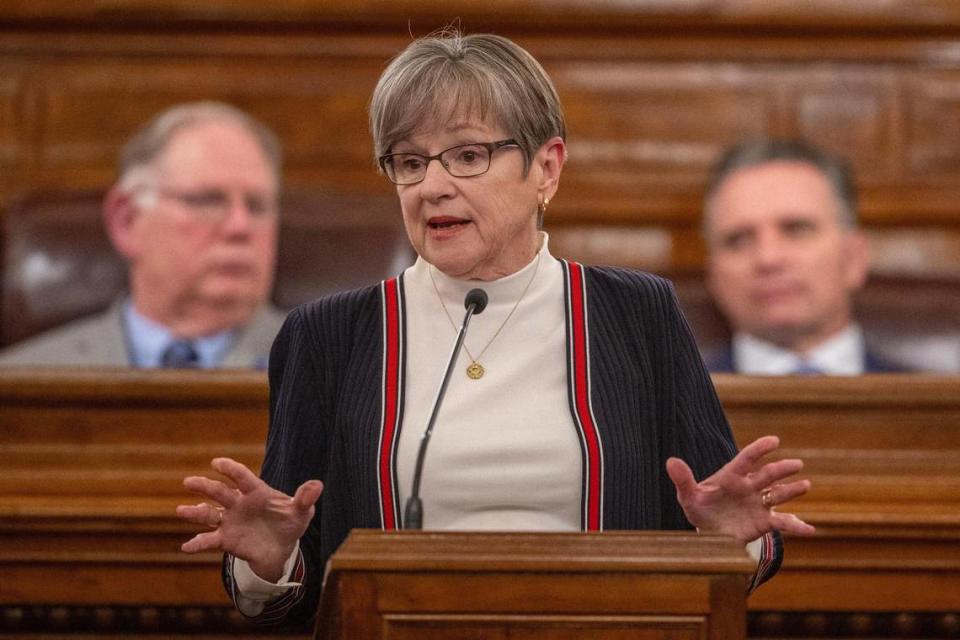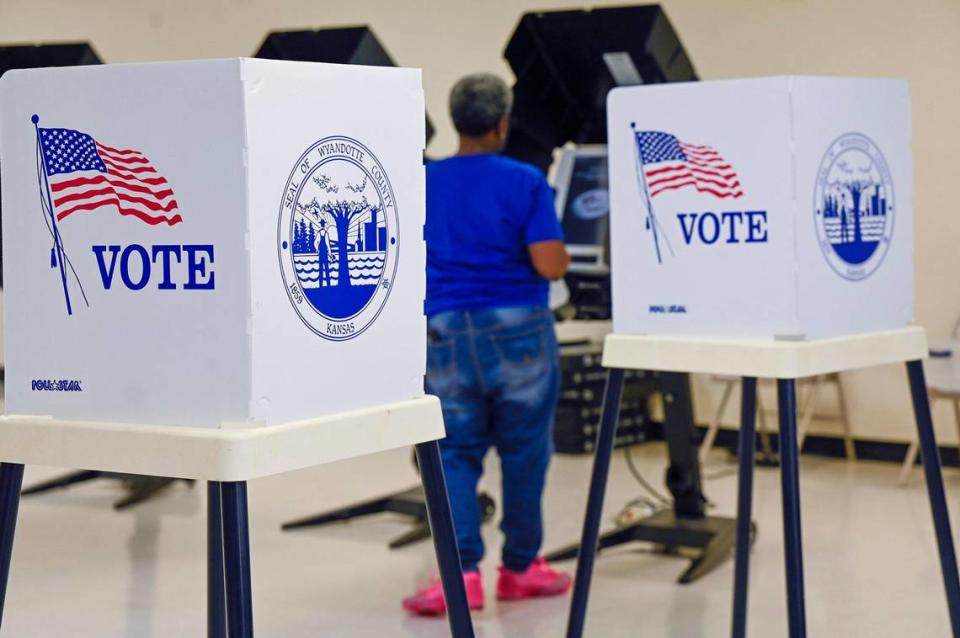GOP-supported changes to Kansas elections vetoed by Gov. Laura Kelly, struggle to pass
- Oops!Something went wrong.Please try again later.
Kansas Republicans appear set to largely fail in their push for major changes to the state’s elections, as the state Supreme Court prepares to issue a potentially landmark voting rights decision.
The GOP-controlled Legislature, which reconvenes Thursday, may successfully block election officials from taking federal dollars to register or help voters. But a push to eliminate a grace period for late-arriving mailed ballots is faltering.
Democratic Gov. Laura Kelly on Friday vetoed two election-related measures, but the bills’ supporters appear to potentially have enough votes to override only one veto. Another proposal, which would end the current three-day grace period for ballots arriving after Election Day, may pass but with margins well short of what’s needed for an override.
“Kansans have a right to participate in our democracy, but time and again some politicians have tried to interfere in the voting process. I will continue to oppose efforts that place obstacles between voters casting their ballots and making their voices heard,” Kelly said in a veto message.
The series of bills marks the latest effort by Republican lawmakers, including some who have promoted or entertained false claims about the 2020 election, to overhaul Kansas’ election system in ways that place more limits on voting. Supporters of the changes have encountered fierce resistance from Democrats and opposition from some Republicans, who say the state’s elections are already secure.
One of the vetoed measures, HB 2614, would add a label to advance ballots warning that it’s illegal for anyone to deliver more than 10 advance ballots, as well as implement additional signature requirements for individuals who return advance ballots on behalf of someone else. Local election officials would be required to track the names of everyone who delivers an advance ballot for someone else and notify prosecutors if they return more than 10.
The measure passed the Senate 26-13, just one vote shy of a veto-proof majority, but passed the House 75-48 – well short of the 84 votes needed. Kelly called the bill an attempt to disenfranchise voters by enacting “burdensome and unnecessary requirements that are designed to restrict and suppress advanced voting.”
The legislation comes ahead of a highly anticipated Kansas Supreme Court decision that could upend state election law. Last year, the Kansas Court of Appeals ruled that voting is a fundamental right, meaning that restrictions on voting could face strict scrutiny, the highest standard of legal review.
If the state Supreme Court upholds the lower court opinion, it will dramatically constrict the power of lawmakers to enact restrictions on voting, including potentially overturning the 10-ballot limit. It’s unclear when the court will release a decision; no deadline exists, meaning an opinion could come anytime.
“Those who wish to change our election laws would be able to mount a credible challenge to the vast majority of what people consider commonplace, completely reasonable restrictions like closing elections at seven o’clock,” Kansas Attorney General Kris Kobach, a Republican, has previously said.
The other election bill vetoed by Kelly, HB 2618, stands a better chance of becoming law. The measure passed the Senate 26-13 and the House 83-40.
The bill would limit the ability of government officials to accept federal funding related to elections, an attempt to limit the ability of President Joe Biden or another Democratic presidential administration to direct dollars into Kansas elections. It blocks officials from using federal dollars for activities related to election administration, including voter registration and voter assistance.
The measure also changes the state crime involving impersonating an election official, which is currently under review at the Kansas Supreme Court. State law currently criminalizes behavior that “gives the appearance” or “cause another person to believe” you are an election official. Justices appeared skeptical of the law when they heard oral arguments in February.
The vetoed legislation would remove “engaging in conduct that gives the appearance of being an election official” from the list of behavior that constitutes impersonating an election official. It would also add a requirement that the crime requires intent to cause someone else to believe you are an election official. The changes are intended to undercut the Kansas Supreme Court’s looming decision.
“We can never rest on our laurels when it comes to the security of Kansas elections. These common-sense pieces of legislation simply shore up current election laws and ensure the federal government isn’t putting its thumb unfairly on the scale in either direction,” House Speaker Dan Hawkins, a Wichita Republican, said in a statement.
Hawkins said House Republicans would “continue fighting” to keep elections secure and ensure voter confidence. But unlike other statements on Friday in response to vetoes, he did not promise a veto override attempt.

End to grace period?
The Legislature will meet for potentially several weeks in a wrap-up session and GOP lawmakers may try to pass one final election bill, which would stop mailed ballots that arrive after Election Day from being counted. Currently, ballots postmarked by Election Day count if they arrive within three days.
SB 14 would end the grace period, but require election officials to send advanced ballots two days earlier than they currently do. It would also require Kansas voters to register to vote two days earlier, eliminate in-person advance voting the day before an election and require election officials to offer in-person advance voting for four hours the Saturday before an election. Many of the changes would not take effect until 2025.
The House passed the bill 73-48, but it fell one vote short in a 20-19 Senate vote. Legislative negotiators will continue working on the bill and it’s possible a similar version could pass. Still, Kelly will likely veto the measure and supporters appear far short of the votes necessary for an override.
When explaining why they oppose the grace period, Republicans have raised concerns about ballots they say are arriving without postmarks after Election Day in some rural counties
“I really, really believe that we’re going to find out that there’s hundreds or thousands of ballots that are not being counted because they’re not postmarked,” said Rep. Pat Proctor, a Leavenworth Republican who chairs the House Elections Committee.
But Democrats question whether mailed ballots were actually arriving without a postmark and have suggested that a solution to any problem with postmarks rests with the postal service, not in election law. Democrats and voting rights advocates insist the three-day period is necessary to ensure mailed ballots can be counted, even if the postal service is moving slowly.
The proposal, they argue, will sow additional voter confusion. “If it’s not broke, don’t fix it,” Sen. Oletha Faust-Goudeau, a Wichita Democrat, said.

It’s unclear how many counties have been forced to toss ballots because they were not postmarked. The Kansas Secretary of State’s Office has asked county election officials to report that information. However, that will not be available until August.
In Wabaunsee County, Abby Amick, the county clerk, said ballots do not arrive at her office postmarked so she is not able to count any that arrive after 7 p.m. on Election Day.
“If the three-day grace period was put in to give voters more opportunity to get their ballot in and have it count but it’s not working out that way,” she said. “It’s not serving the voters the way it was intended.”
Davis Hammet, the president of the civic engagement group Loud Light, said local officials should be able to work with the Kansas Secretary of State’s Office and the post office to resolve the issue.
“If they found a tiny issue in a county, instead of addressing it with a post office, they want to throw out everyone else’s ballot. Which is absurd,” he said, adding that the changes to voter registration will make it harder for young Kansans to vote.
The Star’s Katie Bernard contributed reporting

